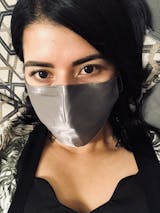Balanced hormones are integral to healthy glowing skin. If you have been experiencing skin problems then focusing on hormonal balance could make all the difference.
We all want that radiant sparkle that comes with nourished skin, but how do you do it?
In this article, we take a look at different ways you can balance hormones, and how your hormones could be affecting your skin.
How Can I Balance My Hormones For Healthy Skin?
Living a balanced lifestyle, cleaning up your diet, being more mindful about what you are putting on, and in your body helps to balance hormones for healthy skin. Your skin is the largest organ of your body, and so it responds to not only the health of your body internally, but what you put onto it externally.
If you have an inkling that hormonal imbalance could be the underlying trigger to skin issues, then here are some easy natural ways to balance hormones.
Tips To Fix Hormonal Imbalance
-
Eat A Balanced Whole Food Diet
Many skin issues arise due to poor diet choices. Your skin needs the proper vitamins and minerals to restore and repair itself. Certain foods and drinks are prone to causing hormonal imbalance and inflammation within the body. Inflammation is a common trigger for skin issues such as acne, psoriasis, eczema, and dermatitis.
Artificial sugar has been linked to inflammation, increasing the risk of acne, and causing premature aging by affecting collagen networks.¹ So cutting down on artificial sugar to avoid unnaturally increasing your blood sugar level, and switching to natural sugar from fruit sources can help to improve skin texture, and brighten your complexion.
Clinical research has also shown that there is a correlation between acne and dairy consumption.¹ So cutting down on the pizzas could be a good call too. Try incorporating a food journal into your daily routine, and cut out some well-known triggers for two months so that you can journal any skin changes. If dairy is a sensitive topic for you, then there are many great plant-based alternatives for milk, cheese, and other dairy-based products.
-
Ensure You Get Enough Vitamins And Minerals
Part of eating a balanced diet is ensuring that you get the right vitamins and minerals for your body type. Fruit and vegetables which are high in fatty acids such as omega 3 fatty acids are vital for skin repair, you’ll find them in cruciferous vegetables like broccoli.
Get tested to see if you have any deficiencies that could be leading to hormonal imbalance. You can either aim to balance vitamins and minerals through a diet plan which is the most efficient option, or you can take supplements.
In general, vitamins and minerals are super important for skin protection and skin barrier function. Medical research shows that fruits and vegetables are a natural protection against forms of cancer, including skin cancer. The studies found that the more vegetables and fruit you consume, the lower the risk of abnormal cells developing.
-
Use Clean And Natural Beauty Products
Choose your beauty and self-care products carefully. The skin is a two-way street. Not only does it excrete waste through sweat, but it also absorbs substances too. Unfortunately, there are many products on the shelves that contain ingredients that are known to cause hormone imbalances.
For example, parabens are classed as endocrine-disrupting chemicals (EDCs).² However, they are still found in most beauty products across the world - such as sunscreens, moisturizers, and soaps. Shopping in ethical stores that focus on natural beauty products is an easy way to keep it simple and stress-free.
Here are some great alternatives if you want to be sure that your skincare products aren’t contributing to hormonal imbalance: UpCircle Cinnamon And Ginger Soap Bar, UpCircle Face Moisturizer With Argan Powder, Malu Day Cream With SPF 30.
-
Develop A Self-Care Routine To Offset Stress Hormones
Stress hormones can easily cause hormonal imbalance if you aren’t consciously destressing and relaxing the body. Stress causes an increase in hormones such as cortisol and epinephrine (adrenaline). And these hormones can trigger inflammation and contribute to skin problems and irritation.
Taking the time to pamper yourself can be a beautiful way to lower stress levels and avoid chronic stress. Once a week invest in your self-care ritual with a delicious skin-care routine such as exfoliation, face mask, and nourishing serum. Try out the UpCircle Coffee Face Scrub With Citrus Blend, EarthWise Catharsis Face Mask, and UpCircle Face Serum With Coffee Oil.
-
Get Enough Sleep
Melatonin is known as the sleep hormone that controls the sleep-wake cycle, but it also affects the skin. Melatonin rises during the evening which makes us feel peaceful and relaxed. However, research shows that light pollution affects our sleep-wake cycle, and can cause insomnia and disturbed sleep patterns.³
Different wavelengths of light are emitted from artificial light, and these can mess with your melatonin levels. Blue light, in particular, suppresses melatonin when it should be increasing in the evening and that can cause a variety of sleep issues.⁴
But, melatonin is also vital for skin health. Clinical research shows it is a strong protective antioxidant and helps to prevent premature aging. So the disturbance of melatonin’s natural cycle isn’t good for skin health at all.
Be sure to switch off technology that emits artificial light well before bedtime, turn off all artificial light in the bedroom at night, and invest in a good eye mask such as the 100% Pure Organic 22mm Silk Eye Mask to ensure that you get a good night’s rest.
-
Keep A Journal To Locate Triggers
Observe if there are cycles in your skin. Noticing when your skin is looking its best, and when you have a flare-up can be a really easy way to associate triggers with your skin’s patterns.
Note the times you went to bed and woke up, what you ate and drank, any other important factors such as high alcohol, sugar, or caffeine consumption too.
-
Commit To Daily Physical Exercise
Physical exercise is good for the body and mind in so many ways, but it’s also good for hormone balance. Clinical research shows that an exercise program of 60-minutes per day for 3 sessions per week can considerably help to balance hormones after 12 weeks.⁵
Exercise particularly helps to balance growth hormone (GH) which is vital for the homeostasis of the skin and collagen.⁶ And we already know that cortisol is a stress hormone that causes inflammation… well exercise also helps to lower cortisol levels too.
Getting out for a daily walk or jog can also be a combined way to get in a good dose of vitamin D which is vital for skin repair.⁸ Vitamin D is particularly beneficial for inflammation and psoriasis.
How Does Hormonal Imbalance Affect Skin?
Hormone imbalance can cause sensitive, inflamed or irritated skin. Symptoms such as bumps, redness, dryness, acne, poor skin texture, itching, or general sensitivity may occur.⁷
Hormones are chemical messengers that are responsible for almost all of the body’s functions. They trigger complex biological systems that are responsible for growth, metabolism, immunity, digestion, relaxation, and sexual function. So when your hormones aren’t balanced, they not only affect the skin. They have cascading effects on many different parts of your health and wellness.
Foods That Balance Hormones In Females
If you’re looking for some tasty inspiration, here are some ideas to get you started on delicious treats that also feed your skin and help hormonal balance.
-
Cruciferous vegetables are high in omega 3 fatty acids, but so are seeds like chia, pumpkin, flax, and sesame. You can sprinkle them onto steamed veg or your salad to help reduce hormone imbalance.
-
Avocados are amazing for omega 3 fatty acids, but they are also low in carbohydrates. This means that they don’t affect blood sugar levels, or cause hormonal imbalance. You can easily add to salads, create an avocado chickpea hummus, or an avocado dressing for steamed veg.
- Eating enough protein is vital to combat hormone imbalance. You can find protein in chickpeas, tofu, and tempeh. You can add tofu and tempeh into a zesty stir fry, or make a chickpea curry for a protein kick.
Conclusion
Looking at your lifestyle, self-care, and diet holistically will definitely help to balance hormones, reduce inflammation, skin problems, or potential flare-ups. Allowing your skin to thrive with a strong foundation of vitamins and minerals is the first port of call for balanced hormones.
And don’t forget to follow with checking the sneaky triggers lurking in your beauty and skincare cabinet too. The easiest way to avoid nasties in skincare is to support brands that have healthy hormones and happy women at the heart of their brand values.
Carmen Lee is a certified yoga teacher, childbirth doula, and wellness coach. She educates on womb wellness, sacred wisdom, and ancestral-connected living. You’ll find her passionately advocating radical self-care and transformational self-empowerment through sustainable beauty and self-love rituals.
Some of the products promoted in our blog are from our online store. Many others are brands we have researched and found to be great examples of sustainable, ethical, and innovative brands in their field, and we don't make any profit from mentioning them in our blog. #CollaborationOverCompetition
- https://www.ncbi.nlm.nih.gov/pmc/articles/PMC4106357/
- https://pubmed.ncbi.nlm.nih.gov/29596967/
- https://pubmed.ncbi.nlm.nih.gov/32985422/
- https://pubmed.ncbi.nlm.nih.gov/30311830/
- https://www.ncbi.nlm.nih.gov/pmc/articles/PMC6862258/
- https://pubmed.ncbi.nlm.nih.gov/14671001/
- https://pubmed.ncbi.nlm.nih.gov/27873738/
- https://pubmed.ncbi.nlm.nih.gov/21034990/










